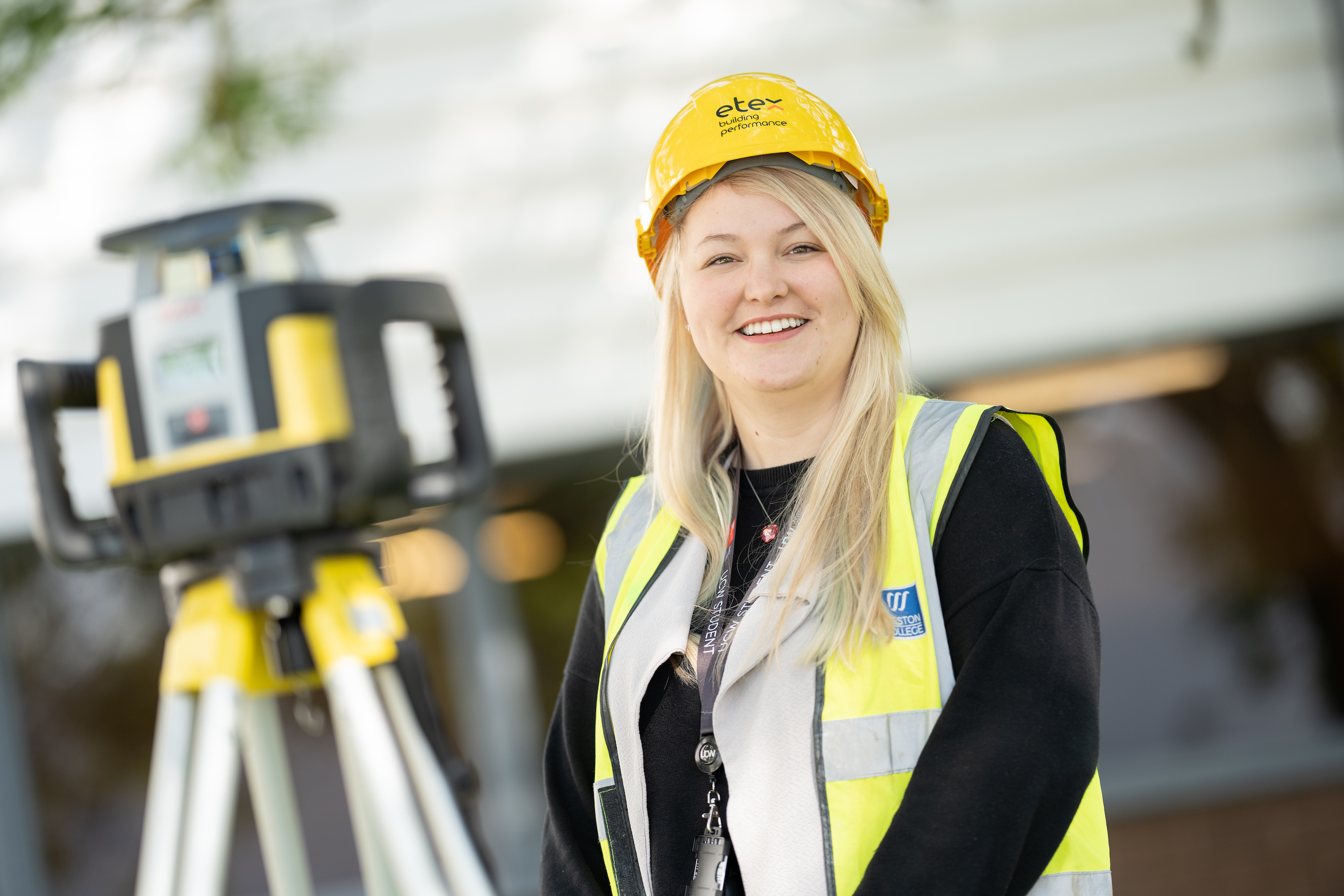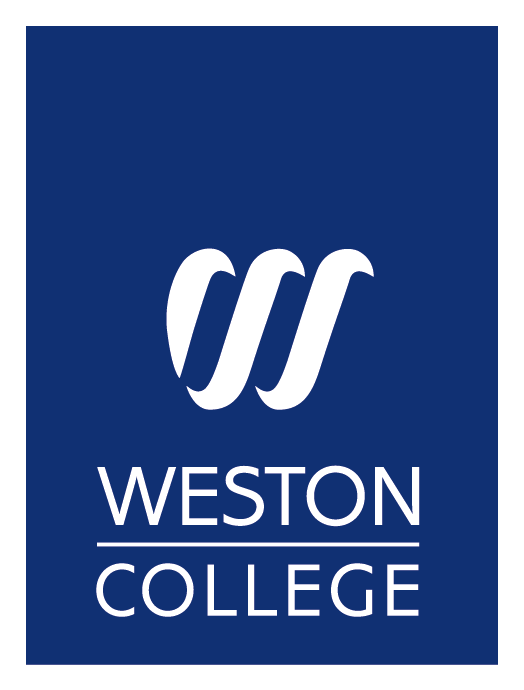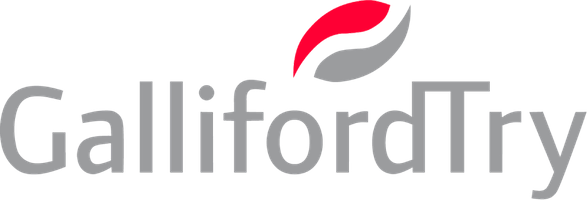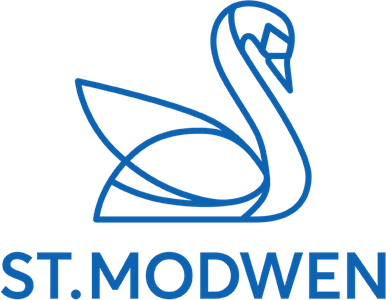
Construction
Construction
CONSTRUCTION COURSES FOR 16-19 YEAR OLDS
The South West’s construction industry annual recruitment requirement of 2.6% per year, is the strongest across the UK and means an extra 32,000 new workers are needed between the end of 2020 and 2025.
Our outstanding range of courses are taught by experienced professionals in high-quality facilities, and provide qualifications that are recognised across the industry.
Use this page to discover your perfect career and associated course options - Vocational qualifications (full-time in the campus workshops) or Apprenticeships in the workplace.

As a Weston College student you will become part of our exciting new Construction Career Excellence Hub. Your study programme will have lots of career boosting benefits, all with the aim of giving you the opportunity to become career ready! This includes unrivalled exposure to employers, enhanced work experience, employer visits and more...
Our Construction Career Excellence Hub endorsers include:

Job Roles in the West of England Currently Include:
WHAT OUR PARTNERS SAY...
We’re delighted to be involved with the Construction Career Excellence Hub. It gives learners the chance to hear from and speak to industry professionals and hear what it is really like to have a career within the construction industry. They can see the breadth of careers our industry has to offer.
Danielle Haskings
Social Value Manager, Wilmott Dixon
The Construction Career Excellence Hub presents an exciting opportunity for us to invest in local talent and develop learners who could become the future leaders in our business.
Weston College is the perfect location for people to develop their construction skills, and we are thrilled to play a role in your development and offer further assistance on your journey into our industry.
David Bowdley
Operations Director, Galliford Try
OUR CONSTRUCTION VIDEOS
Industry Facts
A career in construction can involve all kinds of settings and skills. It could range from working on building sites for new builds, to renovations, to creating beautifully crafted furniture. Led by experienced professionals, with great links with local employers to help launch your career, our courses are designed to give you the skills that will prepare you for employment.
Facilities
The South West Skills Campus offers state-of-the-art training facilities dedicated to construction training.
Facilities
The South West Skills Campus offers state-of-the-art training facilities dedicated to construction training.
These include:
- Large, well-equipped training workshops for each trade area.
- Excellent links with national and local employers to enrich your training.
- Industry-standard materials testing lab.
- Excellent array of tools and equipment, ranging from power tools to digital surveying equipment.
- Carpentry woodworking machine shop, with industry approved machinery.
- Suites of computers with 3D software such as AutoCad.
- Renewable technologies such as biomass and ground- source heat pumps.
- Outdoor working arena.
- Fast, free and secure WiFi connection.
- Specialised software packages for individual subjects.
- A well-resourced library including e-resources and laptop loan service.
- Access to a large number of high specification PCs, laptops, and digital hardware.
LATEST NEWS

<p><a href="https://www.dandaraliving.com/">Dandara Living</a> and Richard Hanney, Head of Construction, have answered your questions and provided guidance on starting and advancing your career in the construction industry from both an employer and college perspective. Our courses, ranging from entry-level to degree apprenticeships, are designed to align with industry needs and support your development in technical and essential personal skills.</p><p> </p><p><em>What Career Options Are There in Construction?</em></p><p><strong>Richard (Head of Construction):</strong></p><p>The construction industry offers a wide range of career paths, including:</p><ul><li>Craft and Trade Roles: Bricklayer, carpenter, plumber, electrician, painter, and decorator.</li><li>Technical and Professional Roles: Site manager, quantity surveyor, project manager, civil engineer, architectural technologist.</li><li>Specialised Areas: Environmental engineer, health and safety manager, construction lawyer.</li><li>Support Roles: Procurement officer, logistics manager, human resources specialist in construction firms.</li><li>Careers in Construction: <a href="https://www.youtube.com/watch?v=JGjJnWwkNXQ">Overview of Over 170 Job Roles | Go Construct</a></li></ul><p><strong>Dandara:</strong></p><ul><li>There is an array of career options in construction!</li><li>The industry is really broad and varied; you could be office or site based. You could work in one specific area of the industry (for example; groundworkers) or work across different project stages (e.g Quantity Surveyor).</li></ul><p> </p><p><em>How Can I Start a Career in Construction?</em></p><p><strong>Richard (Head of Construction):</strong></p><p>You can start a career in construction through various pathways:</p><ul><li>Entry-Level Courses: Begin with foundational courses at Weston College to acquire basic construction skills and knowledge.</li><li>Apprenticeships: Enrol in apprenticeship programs that combine on-the-job training with academic learning, allowing you to earn while you learn.</li><li>Full-Time Courses: Complete full-time courses that provide in-depth knowledge and practical skills, preparing you for advanced roles or apprenticeships.</li><li>Industry Placements: Gain practical experience and make industry connections through placements.</li></ul><p><strong>Dandara:</strong></p><ul><li>Enrol for and attend post-secondary school training at a university or further education college.</li><li>Register as an apprentice and combine on-the-job training with class based learning and get a recognised qualification.</li><li>Try to get work experience days / attend career days etc.</li></ul><p> </p><p><em>What Are the Benefits of Starting a Career in Construction Through an Apprenticeship?</em></p><p><strong>Richard (Head of Construction):</strong></p><p>Apprenticeships offer several benefits:</p><ul><li>Earn While You Learn: Gain practical experience and earn a salary simultaneously.</li><li>Industry-Relevant Skills: Develop skills that are directly applicable to the job market.</li><li>Career Progression: Create a clear pathway for career advancement with opportunities to specialise or take on managerial roles.</li><li>Professional Networking: Build relationships with industry professionals, which can lead to future job opportunities.</li></ul><p><strong>Dandara:</strong></p><ul><li>It’s a great way into the industry. You can start earning money while learning more about the area of work and industry to see if it is for you. You can avoid student debt too and there are lots of options to choose from.</li><li>You will get to work alongside experienced staff and gain job-specific skills.</li></ul><p> </p><p><em>If I Study a Full-Time Course First, Can I Then Do an Apprenticeship Once I Complete My Course?</em></p><p><strong>Richard (Head of Construction):</strong></p><p>Yes, completing a full-time course can make you a more competitive candidate for apprenticeships. Many students pursue an apprenticeship after their studies to gain further practical experience and specialised skills.</p><p><strong>Dandara:</strong></p><p>There are many apprenticeships available within the industry, and at a range of levels from level 2 through to degree level. Depending on your existing qualifications, everyone is eligible for an apprenticeship regardless of age and experience.</p><p> </p><p><em>Are There Any Opportunities to Gain Experience Which Will Help Me Stand Out from the Crowd?</em></p><p><strong>Richard (Head of Construction):</strong></p><p>Yes, you can gain valuable experience through:</p><ul><li>Industry Placements: Structured placements as part of your course curriculum, which often lead to apprenticeships or job offers from the same companies.</li><li>Work Experience Programs: Short-term work experience during holidays or weekends.</li><li>Volunteer Work: Participation in construction-related projects or community initiatives.</li><li>Part-Time Jobs: Part-time work in the construction sector to gain additional experience.</li><li>Help out at home: Apply your accrued skills at home, on DIY projects (remember to speak with your tutor to ensure you are following the correct procedure, and regulations).</li></ul><p><strong>Dandara:</strong></p><ul><li>Lot of companies offer work experience. Dandara Living is starting to do that.</li><li>You can arrange work experience yourself or it can be arranged as a placement as part of a training course. It can last anywhere from a few days, to a few weeks or more.</li></ul><p> </p><p><em>What Support Would I Receive When Starting an Apprenticeship or Work Placement in Construction?</em></p><p><strong>Richard (Head of Construction):</strong></p><p>At Weston College, we provide extensive support, including:</p><ul><li>Mentoring and Guidance: Experienced tutors and assessors to guide you through your apprenticeship or placement.</li><li>Skills Development: Training in both technical skills and personal skills such as communication, problem-solving, and resilience.</li><li>Academic Support: Assistance with coursework and exam preparation.</li><li>Career Services: Help with resume building, interview preparation, and job placement.</li></ul><p><strong>Dandara:</strong></p><ul><li>You will be supported by a number of people as you complete your apprenticeship.</li><li>You will have a team around you of experienced and knowledgeable colleagues who will provide valuable mentoring.</li><li>You will be supported by your line manager who will review your progress regularly and provide constructive feedback to support your ongoing development.</li><li>You will be supported by a Training Provider, possibly a Further Education College, who will provide your knowledge based learning and set activities and tasks for you to complete to evidence the application of your learning. You can expect to be taught by a skilled tutor and guided by a trainer who will ensure you complete all the required elements of the apprenticeship.</li></ul><p> </p><p><em>Are There Opportunities for Career Progression?</em></p><p><strong>Richard (Head of Construction):</strong></p><p>Absolutely. The construction industry offers numerous opportunities for career progression. Starting with entry-level roles, you can move up to supervisory, managerial, and even executive positions. Continuous learning and professional development can lead to specialization in areas such as project management, quantity surveying, or civil engineering.</p><p><strong>Dandara:</strong></p><ul><li>There are a number of ways in which you can progress your career, this could be through gaining further qualifications or experience in your chosen area, progressing into leadership and management roles or moving to other areas of the business.</li><li>As you gain further knowledge and experience, you might even choose to transfer your skills into a new role/area. For example, you may start as a bricklayer and then decide to progress into site management or surveying.</li></ul><p> </p><p><em>What Can I Expect During a Construction Apprenticeship?</em></p><p><strong>Richard (Head of Construction):</strong></p><p>During a construction apprenticeship, you can expect:</p><ul><li>Hands-On Experience: Practical training on real construction projects.</li><li>Academic Learning: Classroom-based learning to complement your on-the-job training.</li><li>Skill Development: Both technical and personal skills, including communication, teamwork, and problem-solving.</li><li>Assessment and Feedback: Regular assessments and feedback to track your progress.</li></ul><p><strong>Dandara:</strong></p><ul><li>You can expect to gain your knowledge and skills in a variety of ways; classroom based, on the job learning and also through practical application of your skills.</li><li>You will be paid throughout your apprenticeship.</li><li>You will gain a nationally recognised qualification.</li><li>You will be expected to commit to learning throughout the duration of your apprenticeship.</li><li>You will be trained on relevant safety processes and procedures.</li></ul><p> </p><p><em>What Are Your Top Tips for Someone Looking to Start Their Career in Construction?</em></p><p><strong>Richard (Head of Construction):</strong></p><ul><li>Gain Experience: Seek out internships, placements, and volunteer opportunities to build your skills and network.</li><li>Stay Informed: Keep up-to-date with industry trends and developments.</li><li>Be Persistent: The construction industry can be competitive, so stay focused and persistent.</li><li>Network: Build relationships with industry professionals and peers.</li><li>Continuous Learning: Always seek opportunities for further education and skill development.</li><li>Register on the government apprenticeship website and receive notifications of apprenticeship opportunities.</li></ul><p> </p><p><em>Who Can I Contact About Starting a Career in Construction?</em></p><p><strong>Richard (Head of Construction):</strong></p><p>You can contact the Construction Department, the college apprenticeship team, or previous tutor/lecturer at Weston College for personalised advice and information. Our team is here to support you every step of the way.</p><p><strong>Dandara:</strong></p><p>Weston College and the apprenticeship website.</p><p> </p><p><em>How Do I Apply for an Apprenticeship in Construction?</em></p><p><strong>Richard (Head of Construction):</strong></p><p>To apply for an apprenticeship in construction:</p><ul><li>Research Opportunities: Look for apprenticeship vacancies on job boards, Gov.uk/apprenticeships, and company websites, and through Weston College’s career services.</li><li>Prepare Your Application: Create a strong resume and cover letter highlighting your skills and experience.</li><li>Apply: Submit your application through the relevant channels.</li><li>Prepare for Interviews: Practice common interview questions and be ready to discuss your experience and why you’re interested in the apprenticeship.</li><li>If you are at college currently build a strong portfolio using Navigate, this can be shared as a PDF with potential apprentice employers.</li></ul><p> </p><p>To see what construction pathway might be best for you, <a href="https://www.weston.ac.uk/what-can-i-study/courses-16-18-year-olds/const… here!</a></p>

<p>Just a few years ago, we launched the exciting <a href="https://www.weston.ac.uk/what-can-i-study/courses-16-18-year-olds/t-lev… Level</a> provision, designed to seamlessly integrate classroom learning with invaluable real-world experience.</p><p>As <a href="https://www.weston.ac.uk/what-can-i-study/courses-16-18-year-olds/t-lev… Levels</a> continue to transform vocational training across the UK, you're likely brimming with questions about what these qualifications truly entail for you and how the industry placement works – from finding the placement to the types of tasks you will complete.</p><p>To give you the inside scoop, we spoke with Sandra Bull (<strong>SB</strong>), Assistant Principal and <a href="https://www.weston.ac.uk/what-can-i-study/courses-16-18-year-olds/t-lev… Level</a> Lead at Weston College, and Paul Korb (<strong>PK</strong>), Health and Safety, Compliance and Sustainability Manager at Rotamec, who welcomes <a href="https://www.weston.ac.uk/what-can-i-study/courses-16-18-year-olds/t-lev… Level</a> learners each year.</p><p>Together, they delve into the details, highlighting the immense benefits and diverse opportunities that <a href="https://www.weston.ac.uk/what-can-i-study/courses-16-18-year-olds/t-lev… Levels</a> offer.</p><p> </p><p><em><strong>How does the Industry Placement fit into the overall T Level programme?</strong></em></p><p><strong>SB</strong>: Each curriculum area designs their delivery with several selected employers as part of our Career Excellence Hub. They use them and the qualification spec to ensure that the placement is built in at the most appropriate time for that industry sector.</p><p>This may alter with each curriculum, for example Education and Early years have a national shortage of room staff so our learners assist via weekly placements.</p><p>In Digital we have employers happier to give projects so this specific division offer placements in blocks so that learners can see a project move from its start to completion.</p><p><strong>PK</strong>: Bringing T Level students into the Rotamec business gives our staff a great opportunity to practise their mentoring skills.</p><p>Young people bring fresh ideas and new ways of thinking that can help our existing staff think differently about the way they do things. In addition to this, it allows the business to assess suitable candidates for an apprenticeship position, a try before we buy scenario.</p><p> </p><p><em><strong>How will my child find an employer to complete an Industry Placement with – do they need to apply and complete an interview?</strong></em></p><p><strong>SB</strong>: We have a team of experienced staff to assist when finding the correct placement. This team will make contact with your child once they are enrolled to the course and between them and the tutor you will have all the guidance and advice required to select the best option.</p><p>Most industry placement will require the learner to have an interview, and this is a great way to find out their expectations and if that fits your child’s career aspiration.</p><p><strong>PK</strong>: Going into any workplace for the first time can be very daunting, especially for youngsters.</p><p>Rotamec has a robust partnership with Weston College. Because of this, Rotamec wishes to ensure that your child feels at ease coming into our workplace and settles into the business in no time.</p><p>The college will arrange everything for your child and will communicate its plan for the placement with us. Prior to attending the workplace, the college will ensure that your child is ready for the placement.</p><p> </p><p><em><strong>Can you provide an overview of the type of tasks my child will be doing during their Industry Placement?</strong></em></p><p><strong>SB</strong>: The Placement Officer and Tutor attached to your industry will explain what tasks may be required to complete and how this will fit into the overall qualification specification leading to the achievement.</p><p><strong>PK</strong>: Each placement will be different depending on the course your child is on. Rotamec ensures that the activities undertaken during the placement, under pins the course.</p><p>Therefore, we will ensure that the placement has a blended learning outcome for your child. There may be some tasks that your child will undertake, but this is essential to give the child the chance to experience a normal working day that may be varied.</p><p> </p><p><em><strong>How many hours per week/term will my child be expected to work during their Industry Placement?</strong></em></p><p><strong>SB</strong>: The overall expectation generally is around 315 hours over the year (for some sectors this will be higher for example Engineering and Early years) so this can be split into even blocks across the two years or their will be an expectation to attend weekly. During your child’s interview for a T Level this will be explained to them linked to their pathway and sector.</p><p><strong>PK</strong>: The placement could vary for each cohort. For T Levels, the work placement will be a minimum of 45 days. However, if your child wishes to attend additional days, we will ensure arrangements are made with the college to accommodate this. School holidays are very popular for the learners to do extra days.</p><p> </p><p><em><strong>What are the benefits for my son/daughter in completing an Industry Placement?</strong></em></p><p><strong>SB</strong>: Placements give valuable work experience, which are very important when it comes to building up a CV. It reflects the learner’s ambition, their work ethic and reliability.</p><p>On top of this, several T Level learners in the past have gained degree apprenticeships with the organisation that they completed their placement with, so this is certainly a big benefit of the T Level.</p><p><strong>PK</strong>: Focusing on professional skills, T Levels have been designed with leading employers to give you the knowledge and skills you need to progress into work, further study or an apprenticeship.</p><p>T Levels combine class-based learning with an industry placement, giving you the chance to get hands-on experience and learn what a real career is like while you continue your studies.</p><p> </p><p><em><strong>What kind of supervision and support will be provided to my child during their Industry Placement?</strong></em></p><p><strong>SB</strong>: Each placement has a dedicated manager or mentor who will be involved with regular reviews between the learner and the college tracking progression and areas to develop.</p><p><strong>PK</strong>: Each candidate is assigned a mentor during their placement. We offer a variety of experience across all departments within the business, and each of the mentors will ensure the safeguarding of the students and support them in the learning, experience and safety.</p><p> </p><p><em><strong>How will my child's progress be monitored and evaluated during their Industry Placement?</strong></em></p><p><strong>SB</strong>: Targets will be set by the learner and the tutor, but also with the mentor and our placement team as required, to ensure progression is measured and at a level that suits their abilities and assessment schedule.</p><p><strong>PK</strong>: As a business, we have created a learning plan that will support the students during their placement with us.</p><p>The learning plan not only assists the mentor in ensuring that the student gets the most out of their experience, but it further ensures that the business covers all the relevant subjects covered on the student’s course.</p><p> </p><p><em><strong>Are there opportunities for my child to continue working with the company after completing their Industry Placement?</strong></em></p><p><strong>SB</strong>: Absolutely and for many this is why they have chosen the T Level route. The programme gives you time and the employer time to find out what options would best fit you into the company as your skills and work behaviours develop. It also gives learners the time to work out if the company is the right fit for them, once they have completed their course.</p><p><strong>PK</strong>: The placement not only benefits the student during their experience with us, but it further allows the business to assess and find the ideal candidate who wishes to pursue a career in our industry. It allows us to “try before we buy” and we will offer an apprenticeship at the completion of their course.</p><p>Not only does this benefit the business, but it also allows the student to sample our business and decide if this is a career path they wish to pursue.</p><p> </p><p><em><strong>What safety measures are in place to ensure my child's wellbeing during their Industry Placement?</strong></em></p><p><strong>SB</strong>: Each placement is required to work with the Placement Officer providing insurance and safety measures. The placement will provide learners with an induction to the environment and their placement officer will be the main contact if something is not correct.</p><p><strong>PK</strong>: The safeguarding of all our staff and especially your child is paramount to us. As a business we have a rigorous Safety Management System to ensure that the students and staff are kept safe. Every staff member and student have a safety induction on their first day in the business. Further safety briefings and training will be provided during their placement. No student is left unattended, during the working hours.</p><p> </p><p><em><strong>Will my child have the opportunity to work on real projects or tasks relevant to their T Level course during their Industry Placement?</strong></em></p><p><strong>SB</strong>: Yes, most placements work on projects that are happening in the workplace now, so it gives the learner a true reflection on what the expectations are if they were to join them as a team after completing the T level.</p><p><strong>PK</strong>: Initially in the first few days, the business will supply training units for the candidates to train on. After a few sessions with the mentor, if they deem the candidates competent enough, they will allow the candidates to work on live projects.</p><p> </p><p><em><strong>Will my child have a designated mentor or point of contact at the company during their Industry Placement?</strong></em></p><p><strong>SB</strong>: Yes, a designated Placement Officer and a Personal Tutor who they will see very regularly.</p><p><strong>PK</strong>: Every student is assigned a mentor that will oversee their work placement. They will also provide feedback to the students and college on their progress. This will identify their strengths and weaknesses that will help the student to develop.</p><p> </p><p><em><strong>How does the Industry Placement align with the specific pathway or specialisation my child is pursuing within their T Level?</strong></em></p><p><strong>SB</strong>: For most T Level routes, you can have two placements in the programme. For many this may result in one for the first year linked to core elements of delivery, with a change over the summer period (as you enter into the second year) to a placement more specific to the chosen pathway.</p><p><strong>PK</strong>: Our business ensures that the lesson plan aligns itself to the specific pathway that the student is on. Sometimes the student may learn additional skills. This is modelled to give the student the maximum experience during their placement.</p><p> </p><p><em><strong>Can you provide examples of past successful Industry Placements and the impact they've had on students' education and career paths?</strong></em></p><p><strong>SB</strong>: We have had a lot of success stories from across our T Level provision. We have seen learners gain scholarships for university, gain their dream degree apprenticeship, and have the doors opened to an exciting career.</p><p>A few success stories include:</p><p>Lauren studied our Health T Level and found her placement really challenging initially but she was supported throughout her placement, where she impressed so much that on completion she gained a job with that employer.</p><p>Maria studied a Digital T Level and completed her placement with Zig Zag Education, where she was working on developing websites. Since completing her T Level, she has gone on to gain a role with Hinkley Point as a Delivery Management System Coordinator.</p><p>Ben completed his construction T Level last year, and on the back of his success was offered a degree apprenticeship with the organisation he completed his placement with.</p><p>Alex was on our Digital T Level programme where he completed his placement with SenseIT, and he has now progressed on to a Digital Technology Degree Apprenticeship with Airbus.</p><p><strong>PK</strong>: Rotamec has some staff who started their placements with us, and applied for an apprenticeship after they left school. Once they had completed their studies, they spent 3 years developing their skills and are now managers of their departments.</p><p>The business has also been recognised within our industry and the various colleges for the contributions to the skills and training of the students and has won various awards. This was all based on the successful accomplishments and the positive impact the students have had on our business.</p><p> </p><p><em><strong>As an employer, what is the best thing about Industry Placements from your point of view?</strong></em></p><p><strong>PK</strong>: Every student that attends our business, could be the future engineer for our industry. They could also be the next supervisor, foreman, or manager. If the student has the attitude for the job, we will assist the student to develop their skills and development. The students assist with the day to day running of the business and has really had a positive impact.</p><p> </p><p>A big thank you to Sandra and Paul for their contribution.</p><p>If you would like to find out more about T Levels, then please <a href="https://www.weston.ac.uk/what-can-i-study/courses-16-18-year-olds/t-lev… here</a>.</p>

<p>Two <a href="https://www.weston.ac.uk/what-can-i-study/courses-16-18-year-olds/t-lev… Level</a> students have recently had the exciting opportunity to complete their placement with Griffiths Farrans JV, as part of their commitment to support the next generation of talent in construction and civil engineering.</p><p>The work placement element of<a href="https://www.weston.ac.uk/what-can-i-study/courses-16-18-year-olds/t-lev…; T Levels</a> (which equates to 20% of the duration of the course) gives learners the opportunity to put the theory they have learned in the classroom into practice and gain real-life experience in an industry related to their course.</p><p>Ned and Kimberly, who study Construction: Design, Surveying and Planning, have been working on an exciting public transport project at Bristol Airport since April, which has involved helping in delivering an enlarged public transport interchange with an enhanced internal road system.</p><p>The learners are also working on an additional multi-story car park which includes waiting rooms and rest facilities. These projects are part of Bristol Airport’s multi-million-pound transformational development plan which aims to allow 12 million passengers a year to use the Airport.</p><p>Kimberly says that the activities she usually carries out day-to-day at her work placement involve taking levels, marking out points for ground works, and creating surveys. The area that she has found the most interesting has been using modern technology to set out different aspects of the construction of the project such as a total station, magnet field controller and GPS to take levels and to set out on site.</p><p>When asked if Kimberly would encourage others to apply to T Levels, she said, “I would definitely recommend T Levels to other students. <a href="https://www.weston.ac.uk/what-can-i-study/courses-16-18-year-olds/t-lev… Levels</a> give you a more practical insight of the career field you want to go into.”</p><p>“Going to placement has really helped me think about my future and has provided a clearer vision of what I may want to do for my future. I am confident that this is the career field I am meant to be in, and I really enjoy it.”</p><p>Click here to read more about T Levels available at Weston College: <a href="https://www.weston.ac.uk/what-can-i-study/courses-16-18-year-olds/t-lev…;













